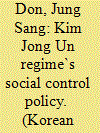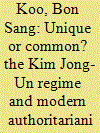|
|
|
Sort Order |
|
|
|
Items / Page
|
|
|
|
|
|
|
| Srl | Item |
| 1 |
ID:
151252


|
|
|
|
|
| Summary/Abstract |
Even during the Kim Jong Un era, the rationing system of North Korea has not yet been recovered. In addition, the thought control system has been weaker than during the Kim Jong Il era. The Kim Jong Un regime stays in power mainly by strengthening political and social control by law enforcement agencies (including police and intelligence agencies). However, there is a lacuna in the control of governmental authority in that giving bribes to public officials enables people to avoid the control. In 2016, social control was strengthened in a situation in which DPRK`s economy cannot be improved due to the sanctions imposed by the UN on it. This will exacerbate the instability of the Kim Jong Un regime. Although the unstable factors during the Kim Jong Un era have increased, it is hard to say that those factors will lead to contingency in North Korea under current conditions. Firstly, a change of people`s consciousness in North Korea is insufficient to bring about a change in its system. Secondly, it is difficult to mobilize and organize the people`s discontent over the Kim Jong-un regime due to the strict control by law enforcement agencies. Thus, a change in the social control system is necessary for fundamental system change in North Korea. To do this, not only further economic sanctions on North Korea and inflow of external information, but also, a lot of pressure especially focused on the North Korean Human Rights Act are required.
|
|
|
|
|
|
|
|
|
|
|
|
|
|
|
|
| 2 |
ID:
110794


|
|
|
|
|
| Publication |
2012.
|
| Summary/Abstract |
This paper discusses the national security challenges and policy dilemmas that
South Korea is predicted to face in the year 2012. North Korea is currently
engrossed in efforts for stabilization of its new regime led by Kim Jong Un. It is
expected that for the time being the two Koreas will seek signals to help facilitate
a shift in the bilateral situation amid the continuing tense situation. Meanwhile,
there remains a high possibility of recurrence of a crisis situation on the Korean
peninsula due to accumulated internal conflicts and the unproven leadership of
the North's new leader. Concerning the North's nuclear program, it is difficult to
expect it will be settled in the way intended at the time of launching the Six-Party
Talks. Under such circumstances, the international community's interest is
focused on what impact the new defense strategy adopted by the United States,
including the planned cuts in the U.S. defense budget over the next decade, will
have on the security situation in Northeast Asia. China's military buildup based
on its rapid economic development has become one of the main security concerns
for the countries in the region. The strategic dilemma associated with China's
military buildup looms large, particularly for South Korea, because the bilateral
relationship between the two Koreas overlaps with the ROK-U.S. alliance and the
relationship between South Korea and China. The best scenario would be if the
G-2, i.e. the United States and China, are willing to assume their share of responsibilities and capabilities in pending issues facing the international community, but
this could be wishful thinking. The importance of the ROK-U.S. alliance cannot be
overemphasized as long as U.S.-China relations remain one of "checking up on one
another" and confrontation, and there are continued threats from North Korea.
The South is certainly not alone in wishing to see China's development in diverse
sectors, i.e. raised GDP, the establishment of a competitive economic system, key
currency, global standards and military power, and increased responsibility and
capability for coping with security threats.
|
|
|
|
|
|
|
|
|
|
|
|
|
|
|
|
| 3 |
ID:
156632


|
|
|
|
|
|
|
|